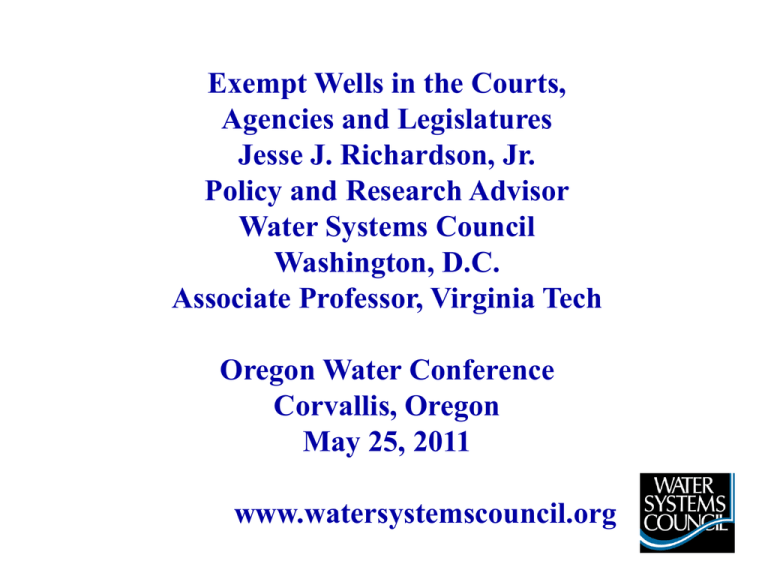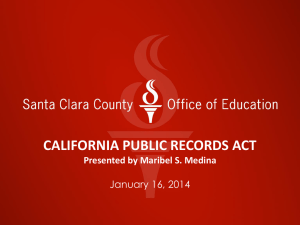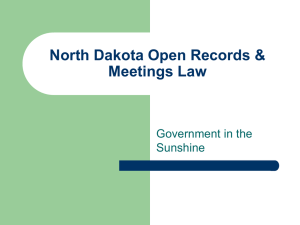View/Open
advertisement

Exempt Wells in the Courts, Agencies and Legislatures Jesse J. Richardson, Jr. Policy and Research Advisor Water Systems Council Washington, D.C. Associate Professor, Virginia Tech Oregon Water Conference Corvallis, Oregon May 25, 2011 www.watersystemscouncil.org Overview •Exempt Wells Generally •Water Systems Council publication •Oregon Exempt Well Regulations •Overview of regulations across the country •Overview of litigation across the country •Conclusions www.watersystemscouncil.org Exempt Wells Generally •The Prior Appropriation Doctrine (used in the West) states that the “first in time is first in right.” Therefore, water rights are administered under a hierarchal system based on the date of priority of the water right. •Senior users have rights that are superior to junior users, and seniors may take their water first, even forcing junior users to cease withdrawals in times of water shortage. •Exempt well regulations generally confer on exempt groundwater uses a legal status which may be administered within the Prior Appropriation system because it grants exempt uses a legal status that is equal to permitted uses. www.watersystemscouncil.org Exempt Wells Generally •“Exempt wells” are water uses that are exempt from one or more permit or other requirements in seventeen western states •Utah is the only state not to have a category of exempt wells •Much controversy www.watersystemscouncil.org Oregon Exempt Well Regulations Exempt Uses in Oregon: •Stockwatering purposes; •Watering any lawn or noncommercial garden not exceeding onehalf acre in area; •Watering the lawns, grounds and fields not exceeding 10 acres in area of schools located within a critical ground water area established pursuant to ORS 537.730 to 537.740; •Single or group domestic purposes in an amount not exceeding 15,000 gallons a day; •Down-hole heat exchange purposes; or, •Any single industrial or commercial purpose in an amount not exceeding 5,000 gallons a day; www.watersystemscouncil.org Oregon Exempt Well Regulations In addition, land application is exempt, so long as the ground water: •Has first been appropriated and used under a permit or certificate issued under ORS 537.625 or 537.630 for a water right issued for industrial purposes or a water right authorizing use of water for confined animal feeding purposes; •Is reused for irrigation purposes and the period of irrigation is a period during which the reused water has never been discharged to the waters of the state; and •Is applied pursuant to a permit issued by the Department of Environmental Quality or the State Department of Agriculture under either ORS 468B.050 to construct and operate a disposal system or ORS 468B.215 to operate a confined animal feeding operation. www.watersystemscouncil.org Oregon Exempt Well Regulations •Exempt from permitting, but other requirements apply •The Department may require any groundwater user, either permitted or exempt, to submit information about the well use. ORS § 537.545(3) •Exempt appropriators who drill wells must submit tax lot maps indicating the location of the wells to the Department. They must also register the exempt uses with the Department within thirty days of completion of well construction, along with a $300 recording fee. ORS §§ 537.545(5)-(7). www.watersystemscouncil.org Oregon Exempt Well RegulationsStacking Exemptions •Exemptions can be “stacked” •The same well can be used for multiple exempt uses, so long as they are different types •Limitations - Can’t stack industrial and commercial exemptions to use more than 5,000 gallons per day (OAR 690-340-0010(1)(d)) -Can’t stack exemptions to allow watering more than ½ acre of lawn from a single well www.watersystemscouncil.org Regulation- types •Construction requirements within exemption- Idaho and Texas (Oregon includes construction requirements in general water well regulations) •Kansas, Nevada, North Dakota, Oregon, and Wyoming- certain information must be submitted www.watersystemscouncil.org Regulation Generally •17 states: 13 prior appropriation states plus 4 others with permitting regimes- 1 of these, Utah, provides no exemptions •Should be called “exempt uses”, but “exempt” uses really not “exempt” •Varying degrees of regulation www.watersystemscouncil.org Regulation- Classification •Alaska and Montana- based on yield only (Alaska gives discount on annual fees to domestic fees) •Seven states (Idaho, Kansas, Nebraska, New Mexico, North Dakota, Oklahoma and Texas) generally base exemption on use •Seven states (Arizona, Colorado, Nevada, Oregon, South Dakota, Washington and Wyoming) classify based on a combination of use and yield or quantity limitations www.watersystemscouncil.org RegulationScope of Exemption •Nebraska- registration only; Washington- permit only; Alaska- fees only •South Dakota- complete exemption? •Idaho, South Dakota and Wyoming- domestic uses are superior (other states, like Colorado, also give preference to domestic uses during droughts) www.watersystemscouncil.org Regulation- Types •Geographic restrictions (e.g., fully or over-appropriated basins): Arizona, Colorado, Montana, Oregon, Nebraska, Nevada, Texas and Washington •The Oregon Water Resources Commission may designate Critical Groundwater Areas when groundwater levels or quality decline. ORS § 537.730(1)- allows regulation of all wells in the basin, including exempt domestic wells, including an order to discontinue use of wells under certain circumstances, and prohibition of the drilling of new wells within the area. ORS § 537.775. •Quantity limitations: Alaska, Arizona, Nevada, New Mexico, Oregon, South Dakota and Texas www.watersystemscouncil.org Regulation- Types •Limited irrigation within domestic: Arizona, Colorado, Idaho, New Mexico, North Dakota, Oregon, Washington and Wyoming •Lower court reversed •Mandatory hook-up to public water in certain circumstancesArizona, Nevada and New Mexico www.watersystemscouncil.org Bounds case (New Mexico) on appeal •Trial court found in favor of Bounds, ruling that exempt well statute violates due process •Court of Appeals reverses: Exempt well provisions constitutional •Some Court of Appeals language raises questions- for example, “prior appropriation is a broad principle” •Supreme Court of New Mexico has accepted appeal, briefs being filed www.watersystemscouncil.org Bounds case ramifications •Other states looking at Bounds with great interest •Not binding, but may be persuasive •Bounds has abandoned due process and takings claims: only claims left relate to prior appropriation doctrine www.watersystemscouncil.org Montana- Administrative Action/Litigation •On December 1, 2009, senior water rights holders filed a petition before the Montana Department of Natural Resources and Conservation (“DNRC”) asking the department to declare the definition of “combined appropriation” invalid and asking the department to initiate rulemaking to amend the definition of “combined appropriation” •On August 17, 2010, DNRC issued a declaratory ruling in response to the petition, finding that the regulation “is consistent and not in conflict with applicable law”. However, the ruling also stated that “increasing demands on water resources in Montana warrant repeal” of the rule and stated an intent to initiate rulemaking within eight months of the ruling. www.watersystemscouncil.org Montana- Administrative Action/Litigation Cont’d •DNR is evaluating a rule that would allow an exempt well to serve to up twelve residential lots with a maximum appropriation of 35 gallons per minute and not to exceed ten acre-feet per year. •Administrative hearing has been appealed to court •On October 5, 2010, notice of public meeting seeking commentsfirst meeting November 1, 2010 •Presumably more hearings throughout state www.watersystemscouncil.org Montana- Administrative Action/Litigation Cont’d •DNR settled appeal of administrative hearing by agreeing to pass a new rule •Apparently, the state legislature is not happy- agency has agreed to freeze action for a time to allow legislature to act •Will the state legislature act? www.watersystemscouncil.org Washington State Litigation- Part 1 •Litigation pending on whether “stock watering” is limited to 5,000 gallons per day •Environmental group lost in the lower court •Has been appealed to Washington Supreme Court www.watersystemscouncil.org Washington State Litigation- Part 2 •On October 19, 2010, the Washington Supreme Court heard arguments in Kittitas County, et al. v. Eastern Washington Growth Management Hearings Board (Case No. 84187-0) •Case focuses on Kittitas County’s compliance with Washington State’s Growth Management statute, the underlying issue focuses on exempt wells. • One justice: Patterns of smaller lots in the rural area result in uncoordinated use of ground water (individual wells) and greater likelihood of groundwater contamination (individual septic systems). (page 60) www.watersystemscouncil.org Washington State Moratorium •Series of moratoria from September 10, 2007 until December 21, 2010 •The Department of Ecology adopted a rule for managing ground water resources in upper Kittitas County on December 22, 2010; the rule became effective January 22, 2011 •Chapter 173-539A WAC withdraws from appropriation all groundwater in Upper Kittitas County with the exception of uses for structures for which a building permit have been granted and vested prior to July 16, 2009 and uses which are determined to be water budget neutral www.watersystemscouncil.org Washington State Moratorium •Water budget neutral projects- identifying water rights that can be placed into the trust water right program to offset their consumptive use of groundwater •Expedites the processing of pilot water banking transactions •Requests a determination of water budget neutrality Technical Assistance and Enforcement •Clarifies what withdrawals are new uses subject to the emergency rule •Metering and reporting requirements www.watersystemscouncil.org Washington State- Even more •Department of Ecology seeking legislative authority to limit exempt wells to less than 5,000 gallons/day •Water marketing/mitigation proposals www.watersystemscouncil.org Overriding issues •Lack of data •Lack of information •Combining with other issues such as growth www.watersystemscouncil.org Exempt Well Benefits •Only source of water in some areas •Cone of depression, including salt intrusion •Public water infrastructure- $$$$$$$$$$ •Security issues •Water as a human right? Possible Future Approaches •Education •Well testing recommendations- annually •Get more data •Construction standards •Better tracking •Water banks •Education www.watersystemscouncil.org Conclusions •Lots of action in the courts, the agencies and the legislatures with respect to exempt wells •Lots of unanswered questions •Expect more action in all arenas www.watersystemscouncil.org








